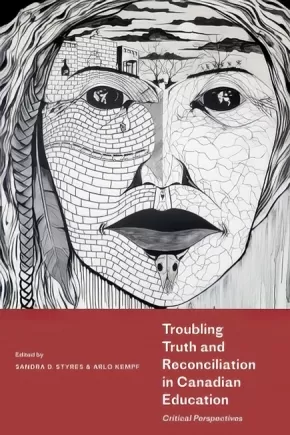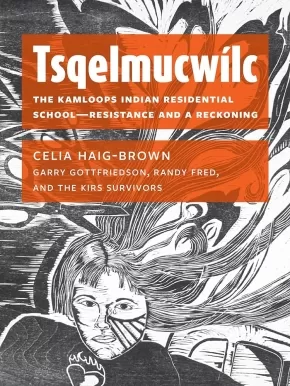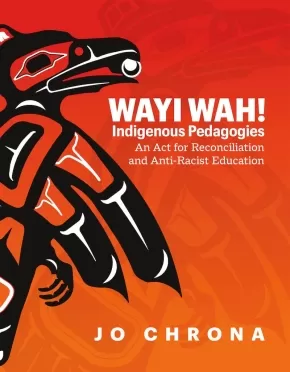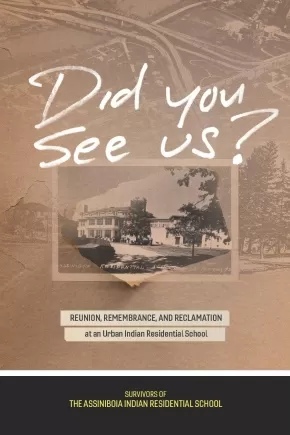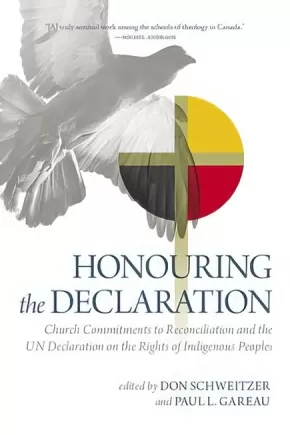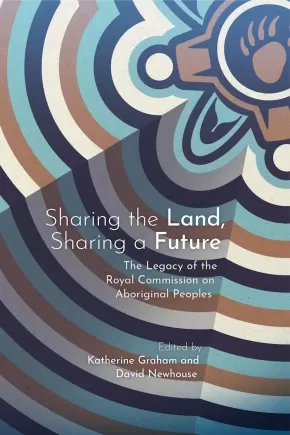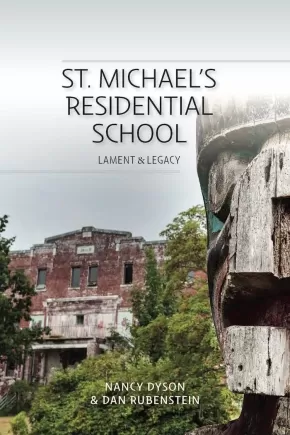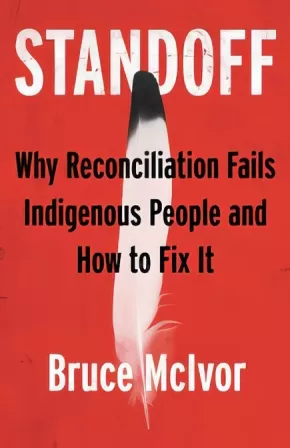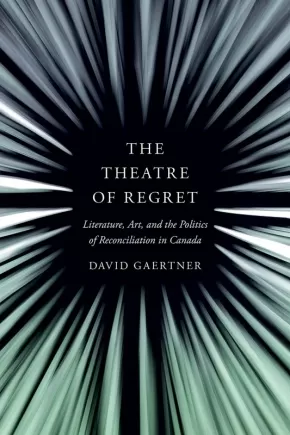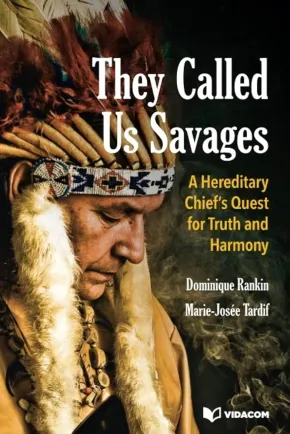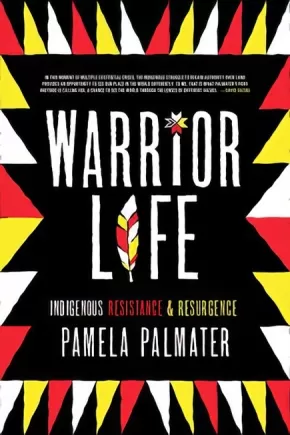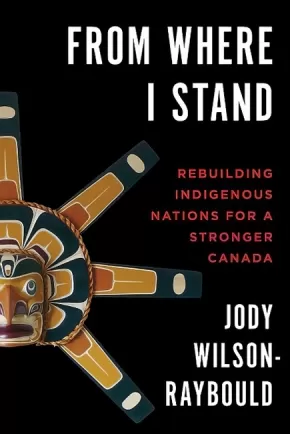Legacy and Reconciliation
Synopsis:
Troubling Truth and Reconciliation in Canadian Education offers a series of critical perspectives concerning reconciliation and reconciliatory efforts between Canadian and Indigenous peoples. Indigenous and non-Indigenous scholars address both theoretical and practical aspects of troubling reconciliation in education across various contexts with significant diversity of thought, approach, and socio-political location. Throughout, the work challenges mainstream reconciliation discourses. This timely, unflinching analysis will be invaluable to scholars and students of Indigenous studies, sociology, and education.
Contributors: Daniela Bascuñán, Jennifer Brant, Liza Brechbill, Shawna Carroll, Frank Deer, George J. Sefa Dei (Nana Adusei Sefa Tweneboah), Lucy El-Sherif, Rachel yacaaʔał George, Celia Haig-Brown, Arlo Kempf, Jeannie Kerr, Ruth Green, David Newhouse, Amy Parent, Michelle Pidgeon, Robin Quantick, Jean-Paul Restoule, Toby Rollo, Mark Sinke, Sandra D. Styres, Lynne Wiltse, Dawn Zinga
Reviews
"This is crucially important work at this time, as universities, provincial education boards, and school districts grapple with their responses to the TRC. The contributors to Troubling Truth and Reconciliation in Canadian Education continue dialogues around reconciliation, decolonization, and Indigenization in schools at every level across Canada and offer real and actionable insights for educational leaders and teachers." - Shannon C. Leddy, University of British Columbia
"Troubling Truth and Reconciliation in Canadian Education is a significant contribution in this era of the post-TRC, the Calls to Action, the MMIWG inquiry report, and the ongoing difficulties and legacies of systemic racism/colonialism against Indigenous peoples in Canadian institutions." - Lisa Korteweg, Lakehead University
Educator Information
Table of Contents
vii Foreword
JAN HARE
xiii Acknowledgements
xv A Troubling Place to Start: Reconciliation in Collapse
ARLO KEMPF, SANDRA D. STYRES, LIZA BRECHBILL AND LUCY EL-SHERIF
I
Theoretical Perspectives on (Ir)reconciliation: Polishing the Silver Covenant Chain
1 | Discovering Truth in the Post-TRC Era: Morality and Spirituality Discourses in the Reconciliatory Journeys of Schools
FRANK DEER
2 | Indigenous Resiliency, Renewal, and Resurgence in Decolonizing Canadian Higher Education
MICHELLE PIDGEON
3 | Uncomfortable Realities: Reconciliation in Higher Education
DAWN ZINGA
4 | Contested Knowledges: Indigeneity, Resistance, and Black Theorizing in Academia
GEORGE J. SEFA DEI (NANA ADUSEI SEFA TWENEBOAH)
5 | Some of Us Are More Canadian Than Others: Pedagogies of Citizenship and Learning Racialized Settlerhood
LUCY EL-SHERIF AND MARK SINKE
6 | The Performativity of Reconciliation: Illusory Justice and the Site C Dam
RACHEL YACAAʔAŁ GEORGE
7 | Beyond Curricula: Colonial Pedagogies in Public Schooling
TOBY ROLLO
II
Reconceptualizing Reconciliation in Education: Teaching and Learning in Right Relation
8 | Reconciliation and Relational Ethics in Education
SANDRA D. STYRES AND ARLO KEMPF
9 | Exploring Tensions in Taking Up the Call for Reconciliation in Teacher Education
LYNNE WILTSE
10 | Troubling Trespass: Moving Settler Teachers Toward Decolonization
DANIELA BASCUÑÁN, MARK SINKE, SHAWNA M. CARROLL, AND JEAN-PAUL RESTOULE
11 | Talking It Through, Talking Through It: A Dialogue on Indigenizing Education
CELIA HAIG-BROWN AND RUTH GREEN
12 | Recalling the Spirit and Intent of Indigenous Literatures
JENNIFER BRANT
13 | Teaching Indigenous Studies in a Time of Reconciliation: An Anticolonial Approach Toward Postcolonial Awareness
DAVID NEWHOUSE AND ROBIN QUANTICK
14 | Contemporary Colonialism and Reconciliation in Higher Education: A Decolonial Response Through Relationality
JEANNIE KERR AND AMY PARENT
Contributors
Additional Information
328 pages | 6.00" x 9.00" | Paperback
Synopsis:
In May 2021, the world was shocked by news of the detection of 215 unmarked graves on the grounds of the former Kamloops Indian Residential School (KIRS) in British Columbia, Canada. Ground-penetrating radar confirmed the deaths of students as young as three in the infamous residential school system, which systematically removed children from their families and brought them to the schools. At these Christian-run, government-supported institutions, they were subjected to physical, mental, and sexual abuse while their Indigenous languages and traditions were stifled and denounced. The egregious abuses suffered in residential schools across the continent caused - as the 2021 discoveries confirmed - death for too many and a multigenerational legacy of trauma for those who survived.
"Tsquelmucwilc" (pronounced cha-CAL-mux-weel) is a Secwepemc phrase loosely translated as "We return to being human again." Tsqelmucwilc is the story of those who survived the Kamloops Indian Residential School, based on the 1988 book Resistance and Renewal, a groundbreaking history of the school - and the first book on residential schools ever published in Canada. Tsqelmucwilc includes the original text as well as new material by the original book's author, Celia Haig-Brown; essays by Secwepemc poet and KIRS survivor Garry Gottfriedson and Nuu-chah-nulth elder and residential school survivor Randy Fred; and first-hand reminiscences by other survivors of KIRS, as well as their children, on their experience and the impact of their trauma throughout their lives.
Read both within and outside the context of the grim 2021 discoveries, Tsqelmucwilc is a tragic story in the history of Indigenous peoples of the indignities suffered at the hands of their colonizers, but it is equally a remarkable tale of Indigenous survival, resilience, and courage.
Additional Information
240 pages | 6.00" x 8.00" | B&W photos throughout | Paperback
Synopsis:
Extend your learning to explore how racism and bias are embedded in education systems, as well as our own perspectives—and how to create equitable education for all learners.
How can Indigenous knowledge systems inform our teaching practices and enhance education? How do we create an education system that embodies an anti-racist approach and equity for all learners?
This powerful and engaging resource is for non-Indigenous educators who want to learn more, are new to these conversations, or want to deepen their learning.
Some educators may come to this work with some trepidation. You may feel that you are not equipped to engage in Indigenous education, reconciliation, or anti-racism work. You may be anxious about perpetuating misconceptions or stereotypes, making mistakes, or giving offence. In these chapters, I invite you to take a walk and have a conversation with a good mind and a good heart.
With over two decades in Indigenous education, author Jo Chrona encourages readers to acknowledge and challenge assumptions, reflect on their own experiences, and envision a more equitable education system for all. Each chapter includes:
- reflection questions to help process the ideas in each chapter
suggestions for taking action in both personal and professional spheres of influence - recommended resources to read, watch, or listen to for further learning
- personal reflections and anecdotes from the author on her own learning journey
- voices of non-Indigenous educators who share their learning and model how to move into, and sit, in places of unknowing and discomfort, so we can examine our own biases and engage in this work in a good way
Grounded in the First Peoples Principles of Learning, this comprehensive guide builds on Chrona’s own experiences in British Columbia’s education system to explore how to shape anti-racist and equitable education systems for all.
Perfect for reading on your own or with your professional learning community!
Educator Information
Table of Contents
1 Where Do We Begin? Setting Up Our Space in A Good Way
- Situating Ourselves
- An Invitation
- Some Structural Guidance as You Read
- Discomfort: Moving Through the Fear of Making Mistakes
- Taking Responsibility
2 Indigenous Education Is Not Multicultural Education
- Defining Indigenous Education
- Culturally Responsive Education and Beyond
3 Yes, You Have a Role: Reconciliation Through Education
- Our Collective Responsibility
- This Is Not “Just History”; This Is Now
- Colonization Past and Present
- Reconciliation Through Education
- A Vision of a System
4 So, Let’s Talk About the R Word
- Begin With Honesty
- Becoming Anti-Racist in Canada
- Investigating Our Own Biases and Assumptions
- How We Define Racism Matters
- Relational Racism
- Systemic Racism
- Learning and Growing
5 An Indigenous-Informed Pedagogy: The First Peoples Principles of Learning
- Moving From “Learning About” to “Learning From”
- How Were the FPPL Identified?
- What Is Important to Know About the FPPL?
- A Closer Look at Each Principle
- Current Contexts
6 Authentic Indigenous Resources
- Voice and Representation
- Authentic Resource Evaluation Criteria
- Collaborative Development of Local First Nations, Inuit, and Métis Resources
7 A Story of One System: Indigenous Education in British Columbia
- On a Learning Journey
- The Power of Indigenous Advocacy and United Voice
- Government Commitments and Obligations
- Bumpy Paths
8 Now What?
- Next Steps
- Final Thoughts: Working in Relation
References
Additional Information
232 pages | 7.00" x 9.00" | Paperback
Synopsis:
The Assiniboia school is unique within Canada’s Indian Residential School system. It was the first residential high school in Manitoba and one of the only residential schools in Canada to be located in a large urban setting. Operating between 1958 and 1973 in a period when the residential school system was in decline, it produced several future leaders, artists, educators, knowledge keepers, and other notable figures. It was in many ways an experiment within the broader destructive framework of Canadian residential schools.
Stitching together memories of arrival at, day-to-day life within, and departure from the school with a socio-historical reconstruction of the school and its position in both Winnipeg and the larger residential school system, Did You See Us? offers a glimpse of Assiniboia that is not available in the archival records. It connects readers with a specific residential school and illustrates that residential schools were often complex spaces where forced assimilation and Indigenous resilience co-existed.
These recollections of Assiniboia at times diverge, but together exhibit Survivor resilience and the strength of the relationships that bond them to this day. The volume captures the troubled history of residential schools. At the same time, it invites the reader to join in a reunion of sorts, entered into through memories and images of students, staff, and neighbours. It is a gathering of diverse knowledges juxtaposed to communicate the complexity of the residential school experience.
Reviews
“Remembering Assiniboia is a thoughtful, community based project rooted in the needs of the Assiniboia Residential School community. This book is a must read for those working on the history of Residential Schools and those engaged in community based restorative justice projects.” — Krista McCracken
"Did You See Us? was born out of a reunion, and readers are invited to the reverberations of this coming together. It offers multi-vocal perspectives primarily from survivors but also from non-Indigenous staff, archival documents, and settler community members. As the Truth and Reconciliation Commission begins to accumulate anniversaries, now more than ever the testimonies of residential school survivors are much needed." — Jane Griffith
Educator Information
Table of Contents
Dedication
Land Acknowledgement Statement/ Theodore Fontaine
Preface / Theodore Fontaine
Section One: The Residential Years (1958-1967)
Section Two: The Hostel Years (1967-1973)
Section Three: Assiniboia and the Archives
Section Four: Staff Remembrances
Section Five: Neighbours
Section Six: Winnipeg Remembers
Section Seven: Reunion and Remembrance
Additional Information
272 pages | 6.00" x 8.50" | bibliography
Synopsis:
How can churches carry out their commitment to the United Nations Declaration on the Rights of Indigenous Peoples?
Honouring the Declaration provides academic resources to help The United Church of Canada and other Canadian denominations enact their commitment to the UN Declaration on the Rights of Indigenous Peoples and offers a framework for reconciliation between Indigenous and non-Indigenous peoples in Canada.
Featuring essays from scholars working from a range of disciplines, including religious studies, Indigenous legal studies, Christian theology and ethics, Biblical studies, Indigenous educational leadership within the United Church, and social activism, the collection includes both Indigenous and non-Indigenous voices, all of whom respond meaningfully to the Truth and Reconciliation Commission's Calls to Action.
The texts explore some of the challenges that accepting the UN Declaration as a framework poses to the United Church and other Canadian denominations, and provides academic reflection on how these challenges can be met. These reflections include concrete proposals for steps that Canadian denominations and their seminaries need to take in light of their commitment to the Declaration, a study of a past attempt of the United Church to be in solidarity with Indigenous peoples, and discussions of ethical concepts and theological doctrines that can empower and guide the church in living out this commitment.
Reviews
“[A] truly seminal work among the schools of theology in Canada.” —Michel Andraos, Dean of Theology, Université Saint-Paul and editor of The Church and Indigenous Peoples in the Americas
Educator Information
Provides a framework for UNDRIP's implementation of the Truth and Reconciliation Commission's Calls to Action for Canadian churches to address and mitigate spiritual violence towards Indigenous Peoples.
Written by scholars at St. Andrew's College, Indigenous scholars, and activist group Iskwewuk Ewichiwitochik/Women Walking Together to provide a framework for the United Church, and other denominations, to adopt UNDRIP and uphold their commitments to reconciliation.
Contributor Sa'ke'j Henderson co-wrote UNDRIP.
Contributors include: James [Sa’ke’j] Youngblood Henderson, Saskatoon, SK; Christine Mitchell, Saskatoon, SK; Lynn Caldwell, Saskatoon, SK; Adrian Jacobs, Beausejour, MB; Sandra Beardsall, Saskatoon, SK; Paul L. Gareau, Edmonton, AB; HyeRan Kim-Cragg, Toronto, ON; Don Schweitzer, Saskatoon, SK; Jennifer Janzen-Ball, Saskatoon, SK; Iskwewuk E-wichiwitochik/ Women Walking Together Collective, Saskatoon, SK
Additional Information
312 pages | 6.00" x 9.00" | Paperback
Synopsis:
Sharing the Land, Sharing a Future looks to both the past and the future as it examines the foundational work of the Royal Commission on Aboriginal Peoples (RCAP) and the legacy of its 1996 report. It assesses the Commission’s influence on subsequent milestones in Indigenous-Canada relations and considers our prospects for a constructive future.
RCAP’s five-year examination of the relationships of First Nations, Metis, and Inuit peoples to Canada and to non-Indigenous Canadians resulted in a new vision for Canada and provided 440 specific recommendations, many of which informed the subsequent work of the Truth and Reconciliation Commission of Canada (TRC). Considered too radical and difficult to implement, RCAP’s recommendations were largely ignored, but the TRC reiterates that longstanding inequalities and imbalances in Canada’s relationship with Indigenous peoples remain and quite literally calls us to action.
With reflections on RCAP’s legacy by its co-chairs, leaders of national Indigenous organizations and the Minister of Indigenous Crown Relations, and leading academics and activists, this collection refocuses our attention on the groundbreaking work already performed by RCAP. Organized thematically, it explores avenues by which we may establish a new relationship, build healthy and powerful communities, engage citizens, and move to action.
Reviews
"Sharing the Land, Sharing a Future provides a critical assessment of the limited progress made in implementing RCAP’s recommendations and consideration of the actions needed to move forward with the TRC’s Calls for Action – that might be a second chance to truly decolonize the situation of Indigenous peoples with homelands in the Canadian territory.” — Peter Russell
“In the current political landscape Sharing the Land, Sharing a Future is an important and necessary work that brings a wealth of scholarship into conversation with post RCAP and TRC realities. By centering the vision of RCAP and asserting decolonial pathways toward Indigenous sovereignty, it will trouble the notion of reconciliation and what that really means in a settler colonial state.” — Jennifer Brant
Educator Information
Other contributors: Marlene Brant Castellano, Frederic Wien, Frances Abele, Erin Alexiuk, Satsan (Herb George), Catherine MacQuarrie, Yvonne Boyer, Josée Lavoie, Derek Kornelson, Jeff Reading, René Dussault, Georges Erasmus, Perry Bellegarde, Natan Obed, Clément Chartier, Robert Bertrand, Carolyn Bennett, Francyne Joe, Jo-ann Archibald (Q’um Q’um Xiiem) Jan Hare, Jennifer S. Dockstator, Jeff S. Denis, Gérard Duhaime, Mark S. Dockstator, Wanda Wuttunee, Charlotte Loppie, John Loxley, Warren Weir, Caroline L. Tait, Devon Napope, Amy Bombay, William Mussell, Carrie Bourassa, Eric Oleson, Sibyl Diver, Janet McElhaney, Cindy Blackstock, Jonathan Dewar, Lynne Davis, Chris Hiller, Aaron Franks, Daniel Salée, Carole Lévesque, Michael Adams
Table of Contents
Chapter 1: Completing Confederation: The Necessary Foundation
Chapter 2: Twenty Years Later: The RCAP Legacy in Indigenous Health System Governance—What about the Next Twenty?
Chapter 3: Address by René Dussault, Co-Chair, Royal Commission on Aboriginal Peoples
Chapter 4: Video Address by Georges Erasmus, Co-Chair, Royal Commission on Aboriginal Peoples
Chapter 5: Address by Perry Bellegarde, National Chief, Assembly of First Nations
Chapter 6: Address by Natan Obed, President, Inuit Tapiriit Kanatami
Chapter 7: Address by Clément Chartier, President, Metis National Council
Chapter 8: Address by Robert Bertrand, National Chief, Congress of Aboriginal Peoples
Chapter 9: Address by Francyne Joe, President, Native Women’s Association of Canada
Chapter 10: Address by Carolyn Bennett, Minister of Indigenous and Northern Affairs Canada
Chapter 11: Thunderbird Is Rising: Indigenizing Education in Canada
Chapter 12: Insights into Community Development in First Nations: A Poverty Action Research
Chapter 13: Indigenous Economic Development with Tenacity
Chapter 14: Powerful Communities, Healthy Communities: A Twenty-Five Year Journey of Healing and Wellness
Chapter 15: Cultural Safety
Chapter 16: What Will It Take? Ending the Canadian Government’s Chronic Failure to Do Better for First Nations Children and Families
Chapter 17: The Art of Healing and Reconciliation: From Time Immemorial through RCAP, the TRC, and Beyond
Chapter 18: Engaging Citizens in Indigenous-Non-Indigenous Relations
Chapter 19: SSHRC and the Conscientious Community: Reflecting and Acting on Indigenous Research and Reconciliation in Response to CTA
Chapter 20: Canada’s Aboriginal Policy and the Politics of Ambivalence: A Policy Tools Perspective
Chapter 21: Executive Summary, Canadian Public Opinion on Aboriginal Peoples
Conclusion: What’s the Way Forward?
Additional Information
504 pages | 6.00" x 9.00"
Synopsis:
One of the few accounts by care-givers in an Indian Residential School describing the horrific conditions.
In 1970, the authors, Nancy Dyson and Dan Rubenstein, were hired as childcare workers at the Alert Bay Student Residence (formerly St. Michael's Indian Residential School) on northern Vancouver Island. Shocked when Indigenous children were forcibly taken from their families, punished for speaking their native language, fed substandard food and severely disciplined for minor offences, Dan and Nancy questioned the way the school was run with its underlying missionary philosophy. When a delegation from the Department of Indian and Northern Affairs visited St. Michael's, the couple presented a long list of concerns, which were ignored. The next day they were dismissed by the administrator of the school. Some years later, in 2015, the Truth and Reconciliation Commission Reports were released. The raw grief and anger of residential school survivors were palpable and the authors' troubling memories of St. Michael's resurfaced. Dan called Reconciliation Canada, and Chief Dr. Robert Joseph encouraged the couple to share their story with today's Canadians.
St. Michael's Residential School: Lament and Legacy is a moving narrative - one of the few told by caregivers who experienced on a daily basis the degradation of Indigenous children. Their account will help to ensure that what went on in the Residential Schools is neither forgotten nor denied.
Additional Information
200 pages | 6.00" x 9.00"
Synopsis:
Faced with a constant stream of news reports of standoffs and confrontations, Canada’s “reconciliation project” has obviously gone off the rails. In this series of concise and thoughtful essays, lawyer and historian Bruce McIvor explains why reconciliation with Indigenous peoples is failing and what needs to be done to fix it.
Widely known as a passionate advocate for Indigenous rights, McIvor reports from the front lines of legal and political disputes that have gripped the nation. From Wet’suwet’en opposition to a pipeline in northern British Columbia, to Mi’kmaw exercising their fishing rights in Nova Scotia, McIvor has been actively involved in advising First Nation clients, fielding industry and non-Indigenous opposition to true reconciliation, and explaining to government officials why their policies are failing.
McIvor’s essays are honest and heartfelt. In clear, plain language he explains the historical and social forces that underpin the development of Indigenous law, criticizes the current legal shortcomings and charts a practical, principled way forward.
By weaving in personal stories of growing up Métis on the fringes of the Peguis First Nation in Manitoba and representing First Nations in court and negotiations, McIvor brings to life the human side of the law and politics surrounding Indigenous peoples’ ongoing struggle for fairness and justice. His writing covers many of the most important issues that have become part of a national dialogue, including systemic racism, treaty rights, violence against Indigenous people, Métis identity, the United Nations Declaration on the Rights of Indigenous People (UNDRIP) and the duty to consult.
McIvor’s message is consistent and powerful: if Canadians are brave enough to confront the reality of the country’s colonialist past and present and insist that politicians replace empty promises with concrete, meaningful change, there is a realistic path forward based on respect, recognition and the implementation of Indigenous rights.
Additional Information
208 pages | 5.50" x 8.50" | Paperback
Synopsis:
The Canadian public largely understands reconciliation as the harmonization of Indigenous–settler relations for the benefit of the nation. But is this really happening? Reconciliation politics, as developed in South America and South Africa, work counter to retributive justice. The Theatre of Regret asks whether – within the contexts of settler colonialism – the approach to reconciliation will ultimately favour the state over the needs and requirements of Indigenous peoples.
Interweaving literature, art, and other creative media throughout his analysis, David Gaertner questions the state-centred frameworks of reconciliation by exploring the critical roles that Indigenous and allied authors play in defining, challenging, and refusing settler regret. In 2007, Canada became the first liberal democracy to formally implement a Truth and Reconciliation Commission (TRC) process, a prominent element of global intrastate politics in the 1990s. Through close examination of core concepts in reconciliation theory – acknowledgment, apology, redress, and forgiveness – Gaertner unpacks reconciliation within the contexts of Canadian settler colonialism and the international history of the TRC. In so doing, he exposes the deeply embedded colonial ideologies that often define reconciliation in settler-colonial states.
The Theatre of Regret redirects current debates about reconciliation and provides a roadmap for the deconstruction of state-centred discourses of regret.
Reviews
"The Theatre of Regret makes a vital contribution to discussions about reconciliation in Canada by foregrounding the importance of Indigenous literatures for engaging, troubling, and, most crucially, speaking far beyond reconciliation’s limits. Gaertner listens deeply to how Indigenous artists speak truths that cannot be unheard and give resonant voice to world-altering ways of living in good relation." — Pauline Wakeham, coeditor of Reconciling Canada: Critical Perspectives on the Culture of Redress
Educator Information
Scholars and students of Indigenous studies, cultural studies, Canadian studies, literature, law, and political science will find this book challenging and necessary, as will thoughtful Canadian readers.
Table of Contents
Introduction: Bearing Witness to the TRC
1 The Theatre of Regret: The Politics of Reconciliation after the Second World War
2 Listen to the Bones: Colonial Static and the Call for Reconciliation
3 To Acknowledge, but Not to Accept: Critical Reflections on Settler State Apologies
4 Redress as a Gift: Historical Reparations and the Logic of the Gift
5 An Exercise in Forgiveness: Confronting the Risk of Forgiveness and Empathy
Conclusion: “Shallow Reconciliation” and the Indigenous Future Imaginary
Notes, Selected Bibliography, Index
Additional Information
320 pages | 6.00" x 9.00" | Paperback
Synopsis:
Young Dominique Rankin was intended to succeed his father as Algonquin Hereditary Chief and Medicine Man. Before that could happen, the Government of Canada’s policies of Indigenous assimilation wrested the boy from his home to entrust him to the infamous Indian residential school system. There, like thousands of Indigenous children across North America, Dominique would endure a terrible ordeal. Only upon leaving the school years later would the young man finally be free to begin a long journey of healing and self-discovery that would reunite him with his heritage and his true destiny.
Weaving the Prophecy of the Seven Fires’ teachings with the powerful narrative of his own tumultuous life, Chief Dominique Rankin delivers a vibrant testimony on respect, forgiveness, and healing. In this poignant memoir, the residential school Survivor, Elder, Medicine Man, and former Grand Chief of the Algonquin Nation bares all—the dark and the light alike—to unshroud a chapter of our sombre collective past and to illuminate a path to a better, brighter future.
Additional Information
160 pages | 6.00" x 9.00" | Paperback
Synopsis:
Since the Truth and Reconciliation Commission released its Calls to Action in June 2015, governments, churches, non-profit, professional and community organizations, corporations, schools and universities, clubs and individuals have asked: “How can I/we participate in reconciliation?”
Recognizing that reconciliation is not only an ultimate goal, but a decolonizing process of journeying in ways that embody everyday acts of resistance, resurgence, and solidarity, coupled with renewed commitments to justice, dialogue, and relationship-building, Pathways of Reconciliation helps readers find their way forward.
The essays in Pathways of Reconciliation address the themes of reframing, learning and healing, researching, and living. They engage with different approaches to reconciliation (within a variety of reconciliation frameworks, either explicit or implicit) and illustrate the complexities of the reconciliation process itself. They canvass multiple and varied pathways of reconciliation, from Indigenous and non-Indigenous perspectives, reflecting a diversity of approaches to the mandate given to all Canadians by the TRC with its Calls to Action.
Together the authors — academics, practitioners, students and ordinary citizens — demonstrate the importance of trying and learning from new and creative approaches to thinking about and practicing reconciliation and reflect on what they have learned from their attempts (both successful and less successful) in the process.
Reviews
“Alerts Canadians to what must be done if we are to seriously embrace the goal of decolonizing relations with Indigenous peoples." – Peter Russell, Professor Emeritus, Department of Political Science, University of Toronto
Educator & Series Information
Table of Contents
Introduction
Ch. 1—Paved with Comfortable Intentions: Moving Beyond Liberal Multiculturalism and Civil Rights Frames on the Road to Transformative Reconciliation
Ch. 2—Perceptions on Truth and Reconciliation: Lessons from Gacaca in Post-Genocide Rwanda
Ch. 3—Monitoring That Reconciles: Reflecting on the TRC’s Call for a National Council for Reconciliation
Ch. 4—A Move to Distract: Mobilizing Truth and Reconciliation in Settler Colonial States
Ch. 5—Teaching Truth Before Reconciliation
Ch. 6—“The Honour of Righting a Wrong:” Circles for Reconciliation
Ch. 7—What Does Reconciliation Mean to Newcomers Post-TRC?
Ch. 8—Healing from Residential School Experiences: Support Workers and Elders on Healing and the Role of Mental Health Professionals
Ch. 9—Learning and reconciliation for the collaborative governance of forestland in northwestern Ontario, Canada
Ch. 10—Bending to the Prevailing Wind: How Apology Repetition Helps Speakers and Hearers Walk Together
Ch. 11—How do I reconcile Child and Family Services’ practice of cultural genocide with my own practice as a CFS social worker?
Ch. 12—Repatriation, Reconciliation, and Refiguring Relationships. A Case study of the return of children’s artwork from the Alberni Indian Residential School to Survivors and their families
Other contributors to this work include: Peter Bush, Tracey Carr, Brian Chartier, Mary Anne Clarke, Ko’ona Cochrane, Aimée Craft, Raymond F. Currie, Rachel (Yacaa?ał) George, Erica Jurgens, Régine Uwibereyeho King, Sheryl Lightfoot, David B. MacDonald, Benjamin Maiangwa, Cody O’Neil, Paulette Regan, Cathy Rocke, John Sinclair, Andrea Walsh, Melanie Zurba
This book is part of the Perceptions on Truth and Reconciliation series.
Additional Information
336 pages | 6.00" x 9.00"
Synopsis:
In a moment where unlawful pipelines are built on Indigenous territories, the RCMP make illegal arrests of land defenders on unceded lands, and anti-Indigenous racism permeates on social media; the government lie that is reconciliation is exposed. Renowned lawyer, author, speaker and activist, Pamela Palmater returns to wade through media headlines and government propaganda and get to heart of key issues lost in the noise.
Warrior Life: Indigenous Resistance and Resurgence is the second collection of writings by Palmater. In keeping with her previous works, numerous op-eds, media commentaries, YouTube channel videos and podcasts, Palmater’s work is fiercely anti-colonial, anti-racist, and more crucial than ever before.
Palmater addresses a range of Indigenous issues — empty political promises, ongoing racism, sexualized genocide, government lawlessness, and the lie that is reconciliation — and makes the complex political and legal implications accessible to the public.
From one of the most important, inspiring and fearless voices in Indigenous rights, decolonization, Canadian politics, social justice, earth justice and beyond, Warrior Life is an unflinching critique of the colonial project that is Canada and a rallying cry for Indigenous peoples and allies alike to forge a path toward a decolonial future through resistance and resurgence.
Reviews
“In this moment of multiple existential crises from climate change to species extinction, ocean degradation, toxic pollution and so on, the Indigenous struggle to regain authority over land provides an opportunity to see our place in the world differently. To me, that is what Palmater’s fiery rhetoric is calling for, a chance to see the world through the lenses of different values.” — David Suzuki
“As governments try to pull the wool over the public eye by suggesting contemporary colonial acts are best for Indigenous peoples, Palmater helps us see the wrongdoing so we can become informed and be respectful change allies. Read this book to see the many faces of colonialism and to learn how truth, justice, and respect can defeat it.” — Cindy Blackstock, First Nations Child and Family Caring Society of Canada
Educator Information
Table of Contents
Foreword by Niigaanwewidam James Sinclair
Harper’s Gone, Now It’s Time to Look Within
The Worst Thing That Could Happen Is A First Nations Minister of Indian Affairs
Will We See Real Nation to Nation Respect With Trudeau?
Evidence of Good Faith Lacking in Trudeau’s Indigenous Agenda
Why Is Trudeau Government Opposing Charter Equality for Indigenous Women?
PM Trudeau’s Nation to Nation Relationship Disappeared with Empty Budget Promises
Trudeau’s Dance of Deception on Indigenous Rights
Trudeau’s Forked Tongue Reconciliation At UN
Indigenous Issues Disappear Slowly from Election 2019
Canada’s Ongoing Racial Discrimination Against Indigenous Women and Children Discussed at United Nations
Lethal Impact of Racism on Indigenous Health
Overincarceration Of Indigenous Peoples Nothing Short of Genocide
First Nations Water Crisis Problems A Crisis of Canada’s Own Making
Saskatchewan: The Land of The Living Skies and Lethal Racism
Justice for Our Stolen Children Camp
How Canada Turned A Blind Eye to The Suicide Crises In First Nations
Don’t Forget the Racist Canadians Behind the Racist Systems
The Ongoing Legacies of Canadian Genocide
Sexualized Genocide
Corporate Conquistadors Rape Indigenous Lands and Bodies
Bill S-3 Amendments to The Indian Act and the Never-Ending Battle for Equality for Indigenous Women
What You Need to Know About Sharon McIvor’s UN Victory on Indian Status
The People Left Behind by Trudeau’s Promised Nation to Nation Relationship (Co-Authored with Sharon McIvor)
Federal Budget 2019 Indigenous Women & Children Left Behind Again
Public Inquiry Needed to Address Sexualized Violence in Policing and Corrections
Why Canada Should Stand Trial for Tina Fontaine’s Murder
Justice System Still Not Protecting Indigenous Women and Girls
Missing and Murdered: Canada’s Genocide Cover-Up
Transitional Justice Plan Needed to End Genocide in Canada
Bill C-92’s Indigenous Child Welfare Act More Pan-Indigenous Legislation That Risks Continuing the Status Quo
Bill C-91 An Act Respecting Indigenous Languages: More Hollow Reconciliation
Canada’s Criminalization of The Indigenous Tobacco Trade
Cannabis Legalization Ignores First Nations
NAFTA 2.0 – Time to Get It Right or Kill It
Bill C-51, Anti-Terrorism Act, Testimony and Questions at Senate Committee on Public Safety and National Security
RCMP Invasion of Wet’suwet’en Nation Territory Breaches Canada’s Rule of Law
Killer Whales, Trans Mountain Pipeline and The Public Interest (Part 1)
It’s Up to Indigenous Environmental Groups to Protect the Public Interest (Part 2)
Clearing the lands has always been at the heart of Canada’s Indian Policy
The blockades no one talks about devastate Indigenous economies
The Liberals Plans for Indigenous Reconciliation are Just Beads and Trinkets
Abolishing the Indian Act Means Eliminating First Nations’ Rights
The Source of Our Power Has Always Been in Our Peoples – Not Voting in Federal Elections
Indigenous Rights are Not Conditional on Public Opinion
Reconciliation with Indigenous Peoples in Universities and Colleges
True Test of Reconciliation: Respect the Indigenous Right to Say No
The Indigenous Right to Say No
A Modern Treaty to Save Our Peoples and the Planet
Social Conflict Inevitable in Decolonization Battle
Indigenous Women Warriors are the Heart of Indigenous Resistance
Wet’suwet’en: a wake-up call for Canada
References
Index
Additional Information
272 pages | 6.00" x 9.00"
Synopsis:
The current framework for reconciliation between Indigenous peoples and the Canadian state is based on the Supreme Court of Canada’s acceptance of the Crown’s assertion of sovereignty, legislative power, and underlying title. The basis of this assertion is a long-standing interpretation of Section 91(24) of Canada’s Constitution, which reads it as a plenary grant of power over Indigenous communities and their lands, leading the courts to simply bypass the question of the inherent right of self-government.
In A Reconciliation without Recollection, Joshua Ben David Nichols argues that if we are to find a meaningful path toward reconciliation, we will need to address the history of sovereignty without assuming its foundations. Exposing the limitations of the current model, Nichols carefully examines the lines of descent and association that underlie the legal conceptualization of the Aboriginal right to govern.
Blending legal analysis with insights drawn from political theory and philosophy, A Reconciliation without Recollection is an ambitious and timely intervention into one of the most pressing concerns in Canada.
Educator Information
This work would be useful for the following subjects or courses: History, Canadian History, Indigenous Studies, Indigenous Politics, Indigenous Law, Law and Society, Philosophy, Political Science.
Includes forwards by John Borrows (Professor and Canada Research Chair in Indigenous Law at the University of Victoria Law School) and James Tully (emeritus distinguished professor of Political Science, Law, Indigenous Governance, and Philosophy at the University of Victoria).
Table of Contents
Part 1 Reconciliation without Recollection
1.1 Reconciliation in Canadian Jurisprudence
1.2 Reconciliation as Picture Thinking
A) Historicism
B) The Ship of State
1.3 History, Law and Legitimacy
1.4 Problem of Reconciliation as Problem of Foundations
1.5 A Genealogy of the Indian Act
Part 2 A Genealogy of Reconciliation: Civilizing, Extinction and Culturalism as the Discursive Foundations of the Indian Act
2.1 Liberty and Legitimate Despotism: The Liberal-Imperialism of J. S. Mill
2.2 The Science of Savage Character: The Uncivilized and Mill’s Philosophy of History
A) Governing the Uncivilized: The Role of the Intermediate Body
B) Peace, Order and Good Government: Mill and the Indian Question
2.3 Reading the Right of History: Universal History and the Extinction Thesis
2.4 From Enfranchisement to Reconciliation: Culturalism and Indirect Rule
Part 3 A Despotism for Dealing with Barbarians: A Survey of the Foundations of Indian Policy in Canada
3.1 Pre-Confederation to the Indian Act of 1876
A) Imperial Federalism
B) Imperial Civilizing
C) Assimilation and Indirect Rule
D) Striation or Continuity?
3.2 The Indian Question and the Dominion
3.3 The Six Nations Status Case
A) The Six Nations of the Grand River
B) The League of Nations and the Mandate System
C) The Documents
3.4 A Building Crisis of Legitimacy
Part 4 A Law Without Measure for a Land Without Citizens: The Indian Act in Canadian Jurisprudence
4.1 The Authority of s. 91(24)
A) St. Catherine’s Milling, s. 91(24) and the Division of Powers
B) Interjurisdictional Immunity and s. 91(24)
C) The Theory of Enclaves
D) The Uncertain Measure of Indianness
E) Section 88 and Provincial Law
4.2 The Definition of Indians and the Authority of Bands
A) Legislative Origins
B) The Judicial Definition of Indians
C) The Judicial Definition of Bands
D) Custom Band Councils and the Question of Jurisdiction
4.3 Tsilhqot'in Nation and the Meaning of s. 91(24)
Part 5 An Era of Reconciliation, An Era of Indirect Rule: From the White Paper to the Full Box of Rights
5.1 The Hidden Player: Policy from Calder to the Indian Act, 1985
A) Line One: Legislative Renovation
B) Line Two: Land Claim Agreements
C) Line Three: Constitutional Change
D) The Penner Report
E) The Problem of Implementing the New Relationship
F) The Era of Indirect Rule and the Mechanism of Deferral
5.2 Reconciliation and Implementation
A) Unsettling the Ship of State
B) Recollection without Historicism
C) Implementing Reconciliation-with-Recollection
Bibliography
Additional Information
408 pages | 6.00" x 9.00"
Synopsis:
An Indigenous leader who has dedicated her life to Indigenous Rights, Jody Wilson-Raybould has represented both First Nations and the Crown at the highest levels. And she is not afraid to give Canadians what they need most – straight talk on what has to be done to deconstruct the colonial legacy and achieve true reconciliation in Canada.
In this powerful book, drawn from Wilson-Raybould’s speeches and other writings, she urges us all – governments, Indigenous Nations, everyone – to build upon the momentum already gained in the reconciliation process or risk hard-won progress being lost. The choice is stark: support Indigenous-led initiatives for Nation rebuilding or revert to governments just managing “the problem.” Frank and impassioned, she also argues that true reconciliation will never occur so long as governments deny Indigenous Peoples their rights and the Indian Act continues to exist. Until then, we’ll be stuck in the status quo – mired in conflicts and expensive court cases that do nothing to improve people’s lives or heal the country.
The good news is that Indigenous Nations already have the solutions. Now it is time to act and build a shared future based on the foundations of trust, cooperation, good governance, and recognition. Removing the barriers that are keeping these solutions from being put into effect will not only empower Indigenous Peoples – it will enrich all Canadians and make Canada stronger.
From Where I Stand is indispensable reading for anyone who wants to dig deeper into the reconciliation process and know what they can do to make a difference, from engaged citizens and students to leaders and policy-makers, educators and academics, and lawyers and consultants.
Reviews
"From Where I Stand is a must-read book for all Canadians. Puglaas shares a clear understanding of where we have come from, the issues we must address, and the pathways to a transformed future. Having witnessed her remarkable courage and capacity as Canada’s attorney general and her determination to do what is right without succumbing to unrelenting political pressure, Puglaas stands tall among Canadians as a person for whom truth, thoughtfulness, and principle are not mere words – but values to sustain a different kind of policy and politics." - Mary Ellen Turpel-Lafond (Aki-Kwe), Professor of Law, Allard Law School UBC, and Director of the Residential School History and Dialogue Centre
"Jody Wilson-Raybould's quest for justice has long driven her work. I first saw this when she was a law student and this commitment to justice has only been deepened by subsequent public service. Her unwavering commitment to reconciliation, balance, and good governance springs off every page of this book." - John Borrows, Canada Research Chair in Indigenous Law, University of Victoria Law School
Educator Information
Table of Contents
Foreword
Introduction
Moving through the Postcolonial Door
We Truly Have Come a Long Way ...
Idle No More and Recapturing the Spirit and Intent of the Two Row Wampum
On the Parallels, and Differences, between Canada and South Africa
Our Shared Histories and the Path of Reconciliation
Rights and Recognition
Self-Determination and the Inherent Right of Self-Government
Translating Hard-Fought-For Rights into Practical and Meaningful Benefits
UNDRIP Is the Start Not the Finishing Line
Defining the Path of Reconciliation through Section 35
Indigenous Rights Are Human Rights
Implementing UNDRIP
Governance in the Post-Indian Act World
Toppling the Indian Act Tree
First Nations Jurisdiction over Citizenship
Holding and Managing Our Lands
On Accountability and Transparency
Developing a New Fiscal Relationship
The Governance Toolkit and Building on Our Success
Building Business Relationships and the Duty to Consult
Economic Development Depends on Self-Government
First Nations Are Not a Box to Tick Off
Who Owns and Is Responsible for the Water?
On Certainty and Why It’s Elusive
Restoring Balance, Correcting Injustices, and Remaining Vigilant
A Litmus Test for Reconciliation Is the Status of Women
Preventing First Contacts with the Criminal Justice System
On Sticking Our Necks Out
On Obstruction, Denial, and Canada’s Failure to Uphold the Rule of Law
Each of Us, In Our Own Way, Is a Hiligaxste’
Acknowledgments
A Note on Terminology and the Speeches
Index
Additional Information
264 pages | 6.00" x 9.00"
Synopsis:
Indigenous Relations: Your Guide to Working Effectively with First Nations, Métis, and Inuit.
A timely sequel to the bestselling 21 Things You May Not Know About the Indian Act - and an invaluable guide for anyone seeking to work more effectively with Indigenous Peoples.
We are all treaty people. But what are the everyday impacts of treaties, and how can we effectively work toward reconciliation if we're worried our words and actions will unintentionally cause harm?
Hereditary chief and leading Indigenous relations trainer Bob Joseph is your guide to respecting cultural differences and improving your personal relationships and business interactions with Indigenous Peoples. Practical and inclusive, Indigenous Relations interprets the difference between hereditary and elected leadership, and why it matters; explains the intricacies of Aboriginal Rights and Title, and the treaty process; and demonstrates the lasting impact of the Indian Act, including the barriers that Indigenous communities face and the truth behind common myths and stereotypes perpetuated since Confederation.
Indigenous Relations equips you with the necessary knowledge to respectfully avoid missteps in your work and daily life, and offers an eight-part process to help business and government work more effectively with Indigenous Peoples - benefitting workplace culture as well as the bottom line. Indigenous Relations is an invaluable tool for anyone who wants to improve their cultural competency and undo the legacy of the Indian Act.
Educator Information
Recommended in the Canadian Indigenous Books for Schools 2020/2021 resource list for grades 11 and 12 in these areas: Social Studies, Law, English Language Arts, and Social Justice.
Additional Information
200 pages | 8.00" x 5.00"

